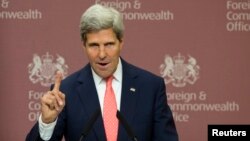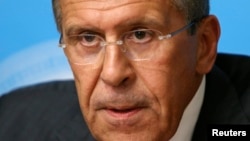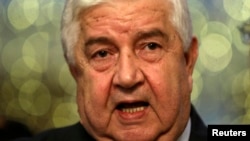BEIRUT —
Amid the diplomatic flurry over Russia’s proposal to put Syrian chemical weapons under international control, regional experts are wondering if it’s even possible to carry out a chemical weapons disarmament process during a brutal civil war.
Most experts dismiss suggestions that this can be done easily or quickly, and certainly not within the tight timetables being mentioned by some diplomats this week.
The proposal gained momentum when U.S. Secretary of State John Kerry, in what seemed like an offhand remark this past week, mentioned chemical weapons disarmament as a possible solution to the Syria impasse. Moscow picked up on the remark almost immediately and offered it as a proposal and the Syrians, again almost immediately, accepted it.
With President Obama now pursuing diplomatic efforts to isolate and remove Syria's chemical weapons, experts say the idea just may be workable, if extremely challenging -- and if, of course, President Bashar al-Assad’s Syrian regime is serious about giving up an arsenal that includes hundreds of tons of deadly nerve agents.
Syrian rebels who have been battling to oust Assad for more than two years have dubbed the disarmament offer a “cheap trick.” The opposition Syrian National Coalition argues that it is a “political maneuver that will lead to pointless procrastination and will cause more death and destruction to the people of Syria.”
The White House has also sounded a strong note of doubt, fearing that Assad is engaged in a delaying tactic to avoid U.S. reprisals for the August 21 attack on 11 neighborhoods in the Damascus suburbs that, according to U.S. intelligence reports, involved Sarin gas and killed more than 1,400 people.
Syria denies attack
The Syrian government says it wasn’t responsible for the attack, claiming variously that it didn’t really happen or that if it did the rebels must be to blame.
Independent experts share the White House’s misgivings about the Assad government’s sincerity and warn that it will be difficult, even under ideal circumstances, to come up with an accurate assessment of just how many chemical weapons Syria could deploy. And even if Syria and the Russians agreed on having the weapons physically removed from Syrian territory, the experts say that could take months to accomplish.
“We are going to have to think literally on how we are going to do it,” said Hamish Bretton-Gordon, a British chemical warfare expert. “To destroy the weapons in situ in a war zone is probably not going to be the best way of doing it. To stockpile as we did in Iraq might be a way and potentially move the weapons out of the country and destroy them then. It is technically possible.”
Bretton-Gordon believes cease-fires for some of the time would have to be agreed while inspections took place, and certainly when the nerve agents, including mustard, Sarin and VX gases, were being transported. Without cease-fires, the danger could be too great for weapons inspectors, most likely drawn from the Organization for the Prohibition of Chemical Weapons, the international body overseeing the Chemical Weapons Convention.
Much will depend on the Syrians providing full disclosure about a chemical weapons arsenal that until this week the Assad government wouldn’t even officially acknowledge.
Car-and-mouse games
In Iraq under Saddam Hussein during the 1990s, U.N. inspectors were forced to play a cat-and-mouse game for years trying to discover hidden weapons sites the regime didn’t want them to find. Eventually, the inspectors dismantled the chemical arsenal, but doubts persisted whether all the nerve agents had been collected and destroyed.
Yezid Sayigh, a senior associate at the Carnegie Endowment’s Middle East Center, believes that so long as the Assad regime is actually willing to give up its chemical weapons, it’s necessary to go ahead despite the apparent chaos in Syria.
“This is feasible because the Syrian chemical weapons have been kept under tight central control according to non-Arab intelligence sources I have talked to,” Sayigh said. “They were impressed that the Syrian regime clearly understood what was needed in this regard. It knew how to keep its chemical weapons under tight control, under guard, and well protected.”
But Sayigh warns, “There will be concern about a cat-and-mouse situation where the regime may hide weapons. If so, do we end up in this very debilitating situation that arose in Iraq during the sanctions regime where the Americans kept insisting there were further hidden facilities?
“We see the perils and pitfalls where we don’t trust either the regime to be telling the truth nor are we sufficiently confident in our own verification abilities,” Sayigh said.
Assad’s good will
Arms-control expert Timothée Germain, a research fellow at the Paris-based Center for International Security and Arms Control Studies, worries that the whole chemical weapon disarmament process will be “wholly dependent on Assad's good will.” He believes that should there be a deal encompassing the surrender of the Syria’s chemical weapons arsenal, its full implementation may prove virtually impossible.
Germain says there are two clear practical options for getting rid of the weapons, either for the “control and destruction [of the weapons] to happen within Syria”, which would require a deployment of huge numbers of inspectors, or to “move the arsenal out of the country and proceed to destroy it there.” The second option was how international inspectors dealt with Libya's nuclear material. Russia would be the most likely country to receive the chemical agents because of its past relations with Syria and its existing infrastructure and equipment needed to destroy the chemical weapons.
“Setting up transfer flights out of Damascus in the middle of a civil war, will be complex,” Germain said. “At any rate, it will take months at least to transfer the entire arsenal out.”
Syrian rebel leaders worry that If a deal goes ahead, what happens during those months while America’s hand is stayed from retaliating for the August 21 attack. The rebels had been hoping the U.S. would use its cruise missiles to attack Assad’s air force and long-range rocket capabilities. They now believe Assad will increase the tempo of operations against the rebellion, arguing that he press his offensive knowing the U.S. would not attack.
Most experts dismiss suggestions that this can be done easily or quickly, and certainly not within the tight timetables being mentioned by some diplomats this week.
The proposal gained momentum when U.S. Secretary of State John Kerry, in what seemed like an offhand remark this past week, mentioned chemical weapons disarmament as a possible solution to the Syria impasse. Moscow picked up on the remark almost immediately and offered it as a proposal and the Syrians, again almost immediately, accepted it.
With President Obama now pursuing diplomatic efforts to isolate and remove Syria's chemical weapons, experts say the idea just may be workable, if extremely challenging -- and if, of course, President Bashar al-Assad’s Syrian regime is serious about giving up an arsenal that includes hundreds of tons of deadly nerve agents.
Syrian rebels who have been battling to oust Assad for more than two years have dubbed the disarmament offer a “cheap trick.” The opposition Syrian National Coalition argues that it is a “political maneuver that will lead to pointless procrastination and will cause more death and destruction to the people of Syria.”
The White House has also sounded a strong note of doubt, fearing that Assad is engaged in a delaying tactic to avoid U.S. reprisals for the August 21 attack on 11 neighborhoods in the Damascus suburbs that, according to U.S. intelligence reports, involved Sarin gas and killed more than 1,400 people.
Syria denies attack
The Syrian government says it wasn’t responsible for the attack, claiming variously that it didn’t really happen or that if it did the rebels must be to blame.
Independent experts share the White House’s misgivings about the Assad government’s sincerity and warn that it will be difficult, even under ideal circumstances, to come up with an accurate assessment of just how many chemical weapons Syria could deploy. And even if Syria and the Russians agreed on having the weapons physically removed from Syrian territory, the experts say that could take months to accomplish.
“We are going to have to think literally on how we are going to do it,” said Hamish Bretton-Gordon, a British chemical warfare expert. “To destroy the weapons in situ in a war zone is probably not going to be the best way of doing it. To stockpile as we did in Iraq might be a way and potentially move the weapons out of the country and destroy them then. It is technically possible.”
Bretton-Gordon believes cease-fires for some of the time would have to be agreed while inspections took place, and certainly when the nerve agents, including mustard, Sarin and VX gases, were being transported. Without cease-fires, the danger could be too great for weapons inspectors, most likely drawn from the Organization for the Prohibition of Chemical Weapons, the international body overseeing the Chemical Weapons Convention.
Much will depend on the Syrians providing full disclosure about a chemical weapons arsenal that until this week the Assad government wouldn’t even officially acknowledge.
Car-and-mouse games
In Iraq under Saddam Hussein during the 1990s, U.N. inspectors were forced to play a cat-and-mouse game for years trying to discover hidden weapons sites the regime didn’t want them to find. Eventually, the inspectors dismantled the chemical arsenal, but doubts persisted whether all the nerve agents had been collected and destroyed.
Yezid Sayigh, a senior associate at the Carnegie Endowment’s Middle East Center, believes that so long as the Assad regime is actually willing to give up its chemical weapons, it’s necessary to go ahead despite the apparent chaos in Syria.
“This is feasible because the Syrian chemical weapons have been kept under tight central control according to non-Arab intelligence sources I have talked to,” Sayigh said. “They were impressed that the Syrian regime clearly understood what was needed in this regard. It knew how to keep its chemical weapons under tight control, under guard, and well protected.”
But Sayigh warns, “There will be concern about a cat-and-mouse situation where the regime may hide weapons. If so, do we end up in this very debilitating situation that arose in Iraq during the sanctions regime where the Americans kept insisting there were further hidden facilities?
“We see the perils and pitfalls where we don’t trust either the regime to be telling the truth nor are we sufficiently confident in our own verification abilities,” Sayigh said.
Assad’s good will
Arms-control expert Timothée Germain, a research fellow at the Paris-based Center for International Security and Arms Control Studies, worries that the whole chemical weapon disarmament process will be “wholly dependent on Assad's good will.” He believes that should there be a deal encompassing the surrender of the Syria’s chemical weapons arsenal, its full implementation may prove virtually impossible.
Germain says there are two clear practical options for getting rid of the weapons, either for the “control and destruction [of the weapons] to happen within Syria”, which would require a deployment of huge numbers of inspectors, or to “move the arsenal out of the country and proceed to destroy it there.” The second option was how international inspectors dealt with Libya's nuclear material. Russia would be the most likely country to receive the chemical agents because of its past relations with Syria and its existing infrastructure and equipment needed to destroy the chemical weapons.
“Setting up transfer flights out of Damascus in the middle of a civil war, will be complex,” Germain said. “At any rate, it will take months at least to transfer the entire arsenal out.”
Syrian rebel leaders worry that If a deal goes ahead, what happens during those months while America’s hand is stayed from retaliating for the August 21 attack. The rebels had been hoping the U.S. would use its cruise missiles to attack Assad’s air force and long-range rocket capabilities. They now believe Assad will increase the tempo of operations against the rebellion, arguing that he press his offensive knowing the U.S. would not attack.



